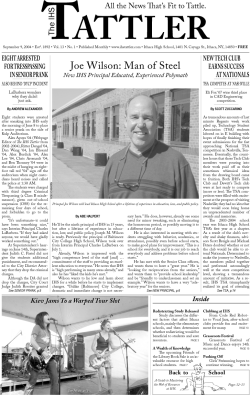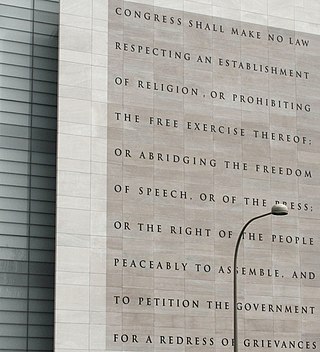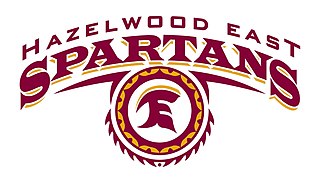
The Tattler is the student newspaper of Ithaca High School in Ithaca, New York. Founded in 1892, it is one of the oldest student newspapers in the United States. It is published twelve times a year and has a circulation of about 3,000, with distribution in both the school and in the community.
Tinker v. Des Moines Independent Community School District, 393 U.S. 503 (1969), was a landmark decision by the United States Supreme Court that defined First Amendment rights of students in U.S. public schools. The Tinker test, also known as the "substantial disruption" test, is still used by courts today to determine whether a school's interest to prevent disruption infringes upon students' First Amendment rights.

In the United States, freedom of speech and expression is strongly protected from government restrictions by the First Amendment to the U.S. Constitution, many state constitutions, and state and federal laws. Freedom of speech, also called free speech, means the free and public expression of opinions without censorship, interference and restraint by the government. The term "freedom of speech" embedded in the First Amendment encompasses the decision what to say as well as what not to say. The Supreme Court of the United States has recognized several categories of speech that are given lesser or no protection by the First Amendment and has recognized that governments may enact reasonable time, place, or manner restrictions on speech. The First Amendment's constitutional right of free speech, which is applicable to state and local governments under the incorporation doctrine, prevents only government restrictions on speech, not restrictions imposed by private individuals or businesses unless they are acting on behalf of the government. However, It can be restricted by time, place and manner in limited circumstances. Some laws may restrict the ability of private businesses and individuals from restricting the speech of others, such as employment laws that restrict employers' ability to prevent employees from disclosing their salary to coworkers or attempting to organize a labor union.
Prior restraint is censorship imposed, usually by a government or institution, on expression, that prohibits particular instances of expression. It is in contrast to censorship that establishes general subject matter restrictions and reviews a particular instance of expression only after the expression has taken place.

A student publication is a media outlet such as a newspaper, magazine, television show, or radio station produced by students at an educational institution. These publications typically cover local and school-related news, but they may also report on national or international news as well. Most student publications are either part of a curricular class or run as an extracurricular activity.

Hazelwood School District (HSD) is a school district in suburban St. Louis, Missouri and is the second largest district in St. Louis County. The District extends from I-70 on the west and the I-270 bridge on the east, covering 78 square miles, an area larger than the City of St. Louis. Its northern and southern boundaries are the two Great Rivers, the Missouri and the Mississippi, and I-270.

Dettmer v. Landon, 799 F.2d 929, is a court case in which the United States Court of Appeals for the Fourth Circuit held that although Wicca was a religion, it was not a violation of the First Amendment to deny a prisoner access to ritual objects.

Hazelwood East High School is one of three high schools in the Hazelwood School District, St. Louis County, Missouri, the others being Hazelwood West High School and Hazelwood Central High School. It is at 11300 Dunn Road in Spanish Lake, Missouri, United States.
In United States constitutional law, a forum is a property that is open to public expression and assembly.

Kincaid v. Gibson, 236 F. 3d 342 was a United States court case before the United States Court of Appeals for the Sixth Circuit dealing with freedom of expression.

Desilets v. Clearview Regional Board of Education, 137 N.J. 585 (1994), was a New Jersey Supreme Court decision that held that public school curricular student newspapers that have not been established as forums for student expression are subject to a lower level of First Amendment protection than independent student expression or newspapers established as forums for student expression.

In Guiles v. Marineau, 461 F.3d 320, cert. denied by 127 S.Ct. 3054 (2007), the U.S. Court of Appeals for the Second Circuit held that the First and Fourteenth Amendments to the Constitution of the United States protect the right of a student in the public schools to wear a shirt insulting the President of the United States and depicting images relating to drugs and alcohol.

California Education Code 48907 (1977), also known as the California Student Free Expression Law, acts as a counter to the Hazelwood v. Kuhlmeier (1988) Supreme Court ruling, which limited the freedom of speech granted to public high school newspapers. The Hazelwood v. Kuhlmeier decision held that public school curricular student newspapers that have not been established as "forums for student expression" are subject to a lower level of First Amendment protection than independent student expression or newspapers established as forums for student expression. Ed Code 48907 affirms the right of high school newspapers to publish whatever they choose, so long as the content isn't explicitly obscene, libelous, or slanderous, and doesn’t incite students to violate any laws or school regulations. The newspaper content must also pass the minimal disruption test set forth in the Supreme Court ruling on Tinker v. Des Moines (1969). In contrast with Hazelwood, which limited First Amendment protection to only those high school newspapers that had, through practice or policy, been established as forums for student expression, Ed Code 48907 affirms the right of all newspapers to the freedom of expression.
Charles Proctor Sifton was a United States district judge of the United States District Court for the Eastern District of New York from 1977 to 2009 and its Chief Judge from 1995 to 2000.
The issue of school speech or curricular speech as it relates to the First Amendment to the United States Constitution has been the center of controversy and litigation since the mid-20th century. The First Amendment's guarantee of freedom of speech applies to students in the public schools. In the landmark decision Tinker v. Des Moines Independent Community School District, the U.S. Supreme Court formally recognized that students do not "shed their constitutional rights to freedom of speech or expression at the schoolhouse gate".

Hosty v. Carter was a 2005 decision by the United States Court of Appeals for the Seventh Circuit that limited the free press rights of college newspapers.
Hazelwood School District v. United States, 433 U.S. 299 (1977), was a court case argued before the United States Supreme Court on April 27, 1977. It concerned employment discrimination and was decided on June 27, 1977.
The censorship of student media in the United States is the suppression of student-run news operations' free speech by school administrative bodies, typically state schools. This consists of schools using their authority to control the funding and distribution of publications, taking down articles, and preventing distribution. Some forms of student media censorship extend to expression not funded by or under the official auspices of the school system or college.
Hazelwood School District et al. v. Kuhlmeier et al., 484 U.S. 260 (1988), was a landmark decision by the Supreme Court of the United States that held that public school curricular student newspapers that have not been established as forums for student expression are subject to a lower level of First Amendment protection than independent student expression or newspapers established as forums for student expression.











